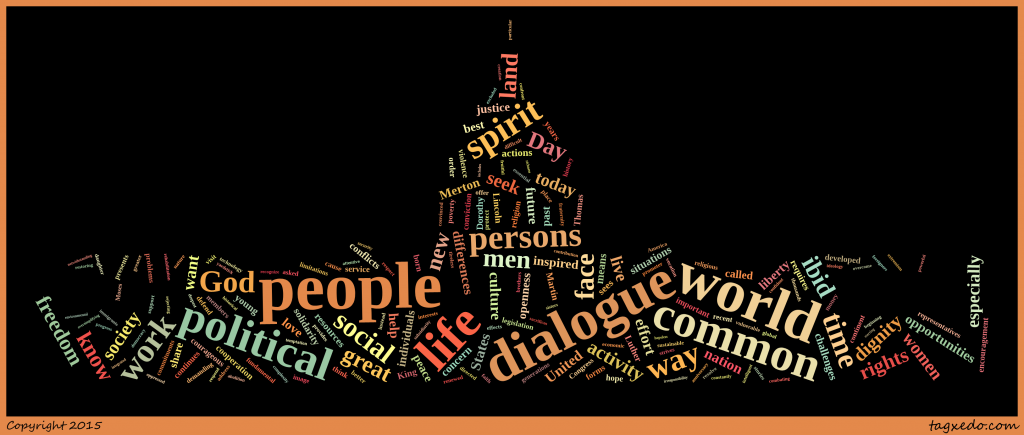Illustrative image for faith and politics: word cloud of Pope Francis’s addressing Congress via Ron Mader
The Iowa Caucus is today, and people around the world are watching to see who will win this important early primary vote in a crowded election cycle. Historically, the GOP Caucus in Iowa has been heavily influenced by voters who identify themselves as Evangelical Christians, and conventional wisdom has long held that voters are unlikely to elect a politician who isn’t religious.
NPR reports that this isn’t necessarily true anymore; Pew Research Center and Public Religion Research Institute released a report finding that voters are generally less religious now, and that even among the faithful, religious beliefs matter less to voters. This might spell good news for Trump, who is seen as the least religious of all candidates.
From the article:
Just 30 percent of U.S. adults view Trump as even “somewhat” religious, according to a new survey from the Pew Research Center. No other candidate, Republican or Democrat, scores lower.
On Sunday, NPR spoke to Evangelical voters in Iowa, to ask them about Trump’s dominance in their polls. They found that Evangelical voters aren’t a monolithic group, and they seem to run counter to nation-wide trends. Some voters said outright appeals to faith felt manipulative, and that they were looking at specific policies and discerning God’s presence. Many voters said that Trump’s platform would run counter to their own Christian beliefs.
From the article:
“I don’t give support simply by quoting the Bible. I want to see it lived out in the policy,” said John Lee, a pastor in Sioux Center. “I’m not electing a pastor in chief. I’m electing a commander in chief.”
Lee doesn’t know who he will vote for in Monday’s caucus, but he knows who he won’t be supporting: Ted Cruz and Donald Trump. Lee said his Christian beliefs lead him to oppose their hard-line immigration stances — policies that are part of what he labels “callous conservatism.”
In the end, Iowa may not prove decisive for the GOP; it didn’t in 2008 or 2012, when Evangelical voters propelled first Huckabee and later Santorum to victory. Neither candidate went on to win the primary.
Others express skepticism that religious views are really key influencers in the voting booth; writing for the Lexington Herald Leader, Paul Prather explores the work of political scientist Matthew MacWilliams, who found that religious influences sometimes seemed to correlate, but weren’t ultimately significant in voters motivations.
From the article:
“Only two of the variables I looked at were statistically significant: authoritarianism, followed by fear of terrorism, though the former was far more significant than the latter.”
Authoritarians, a group studied by social scientists for decades, inclined sharply toward Trump.
MacWilliams summarized what it means to be authoritarian:
“Authoritarians obey. They rally to and follow strong leaders. And they respond aggressively to outsiders, especially when they feel threatened.”
Statistically, MacWilliams found, among those likely to vote in the Republican primary, 49 percent ranked high on the authoritarian scale. That’s more than twice as many as among Democratic voters.
We often see mainstream media focus on how religious affiliation shapes voting and election participation in the Republican party and, separately, in Evangelical churches, but we rarely hear about it in other parties and churches. Do you think that most religious people, regardless of political party or denomination, are motivated by their faith when they vote? Are you? What type of religious factors do you consider when you vote?

